THE SINGING MAGICIAN
Alec the Amazing and All-Powerful Magician and his assistant Mystical Marla have had to put their magic shows on hold because Snowball, the white rabbit that is supposed to emerge from the top hat, is depressed. (more…)

THE SINGING MAGICIAN
Alec the Amazing and All-Powerful Magician and his assistant Mystical Marla have had to put their magic shows on hold because Snowball, the white rabbit that is supposed to emerge from the top hat, is depressed. (more…)
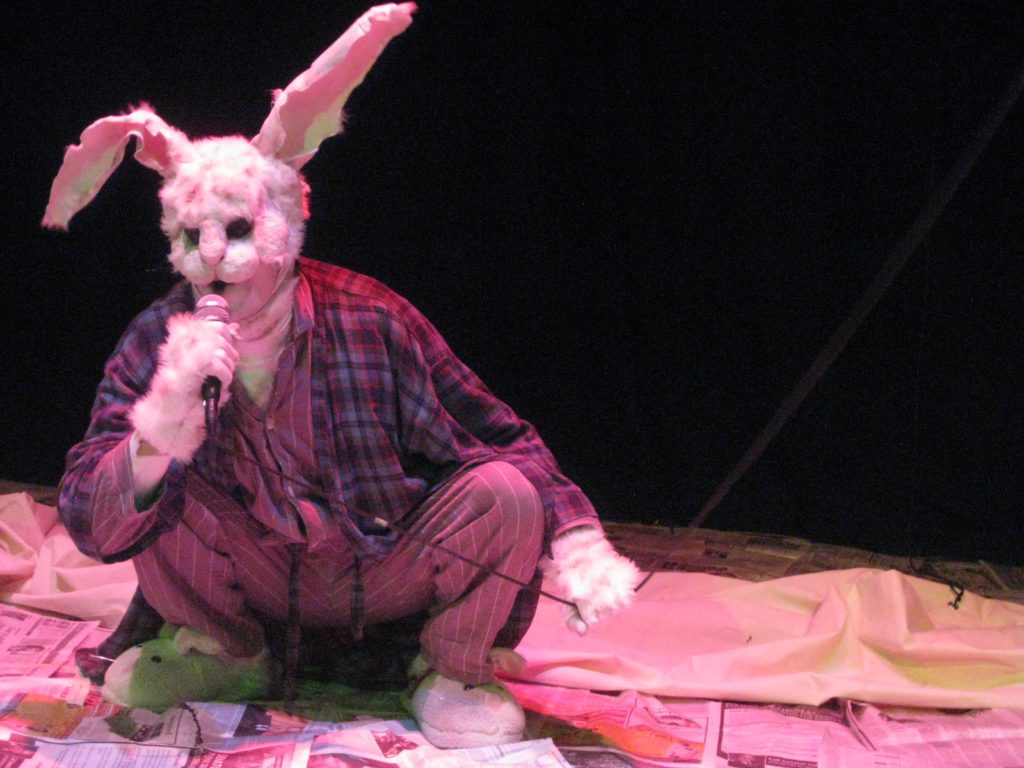
Theatre of the Absurd is alive and well at Buntport where the talented, clever cast and crew have revived their original production, Jugged Rabbit Stew. As created and performed by actors Erik Edborg, Hannah Duggan, Erin Rollman, Eric Weissman, and Brian Colonna along with their talented crew, this musical comedy has all the elements of true absurdity theatre. The characters are caught in a hopeless situation where they engage in dialogue filled with cliches, wordplay and nonsense. The cast sings and clowns getting the audience to laugh as the meaninglessness of the human condition and man’s animal nature and cruelty are exposed.
Snowball, played by Erik Edborg, is a rabbit with magical powers. Not a kindly “Harvey”, this rabbit is in an alcoholic slump that is wreaking havoc on the magician Alec, the Amazing, and Mystical Maria, his assistant. They both struggle with certain physical changes Snowball has perpetrated upon them. Nevertheless, they continue to love him and try to bring him back to sobriety and to make him become the sort of rabbit they want him to be. Snowball, increasing fearful of entrapment and death, circumvents their attempts to change him. He focusses on his collection, an odd assortment of items that he has “gathered” from others in an effort to make their former owners unhappy. Among this assemblage of stuff is Woman, artfully performed by Erin Rollman. Suspended above the stage along with the other items in the collection, Woman sits in a chair for the entire play. In spite of this limitation Ms. Rollman skillfully creates a complex character. She ultimately becomes the agent of change that Alec and Maria have been seeking.
Hannah Duggan and Evan Weissman are very funny as Mystical Maria and Alec. Brian Colonna, as Arm, is so good that one begins to believe that Arm is actually human. Erik Edborg’s costume and his sure acting abilities lend credibility to his role as the tragic hero. The entire cast gave spirited and professional performances. Their singing was flawless – fun to watch and to hear.
The music, while tuneful and even toe tapping, seemed to parody much of the music in the musicals of the last thirty years. Kudos to Adam Stone for mocking the likes of Schonberg, Boublil, and Webber. The theater at 717 Lipan is small and intimate enough that amplification is unnecessary and whenever Mr. Edborg was singing, the amplification was distracting. Snowball either held the microphone too close or was singing too loud. Often it was difficult to understand the words he was singing. Overall the musical was excellent from start to finish.
-Nancy A. Murphy, February 12, 2014, Lowry News
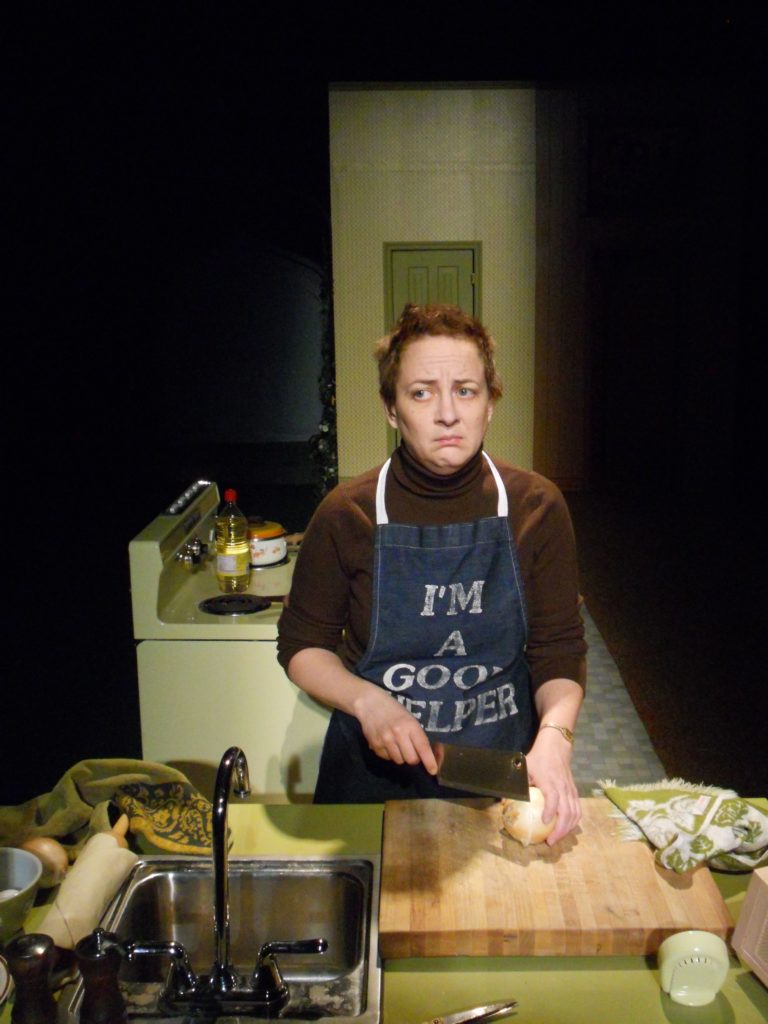
Buntport’s “Electra Onion Eater” is smart, tight and witty, easily within the reach of people who’ve never studied Sophocles’ “Electra” and enormously rewarding for anyone who tackled classic Greek tragedies in college.
All the action takes place on a stage implicitly divided into a side yard, a kitchen and a middle-class living room. Electra (Erin Rollman) stands at the kitchen sink, chopping onions and weeping as she contemplates her miserable family situation.
The play begins after her mother, Clytemnestra (Hannah Duggan), has murdered her father, Agamemnon (Brian Colonna, offstage), who in turn has dispatched Electra’s sister.
As she waits for her brother Orestes (Erik Edborg) to return home, Electra (wearing an apron announcing “I’m a Good Helper”) dreams of murdering her mother as she makes onion pies as offerings to the gods. Viciously chopping onions, she weeps tears provoked both by her losses and the volatile sulfur compound that her knife releases.
“As with cutting onions, there is more than one way to end a man’s life,” Electra observes with weepy optimism.
In their separate rooms, she and her mother are absorbed by soap operas, occasionally exchanging a few words with their unctuous, platitude-spouting neighbor Bruce (Andrew Horowitz). After one of his particularly egregious generalizations, Electra snaps, “THEY do not say that, Bruce! YOU say it!”
Tension is fraught between Electra and her smug mom. Electra glares daggers at Clytemnestra, who smirks back.
“Do you smell something?” she asks her daughter, and sniffs Electra’s shoulder.
“I do! It’s … party poop!”
Electra seethes, barely reining her homicidal instincts while she awaits Orestes. But a rumor of Orestes’ death sends Electra into despair underscored by her mother’s complacent reaction.
“I’m not going to pretend that this isn’t a mixed blessing,” Clytemnestra says cheerily, swilling another drink.
Anyone who paid attention during World Lit knows that things will not end well for Clytemnestra. Buntport’s reimagining of the story is acutely funny. A cremated cat is involved along with a terminally bad hair day and a dream about a giant killer tree.
“Electra Onion Eater” may be Buntport’s most brilliant revision since its seminal and hilarious “Titus Andronicus! The Musical!” It’s a shame the run ends this weekend because so many Great Courses students would absolutely love it.
-Claire Martin, November 22, 2013, Denver Post
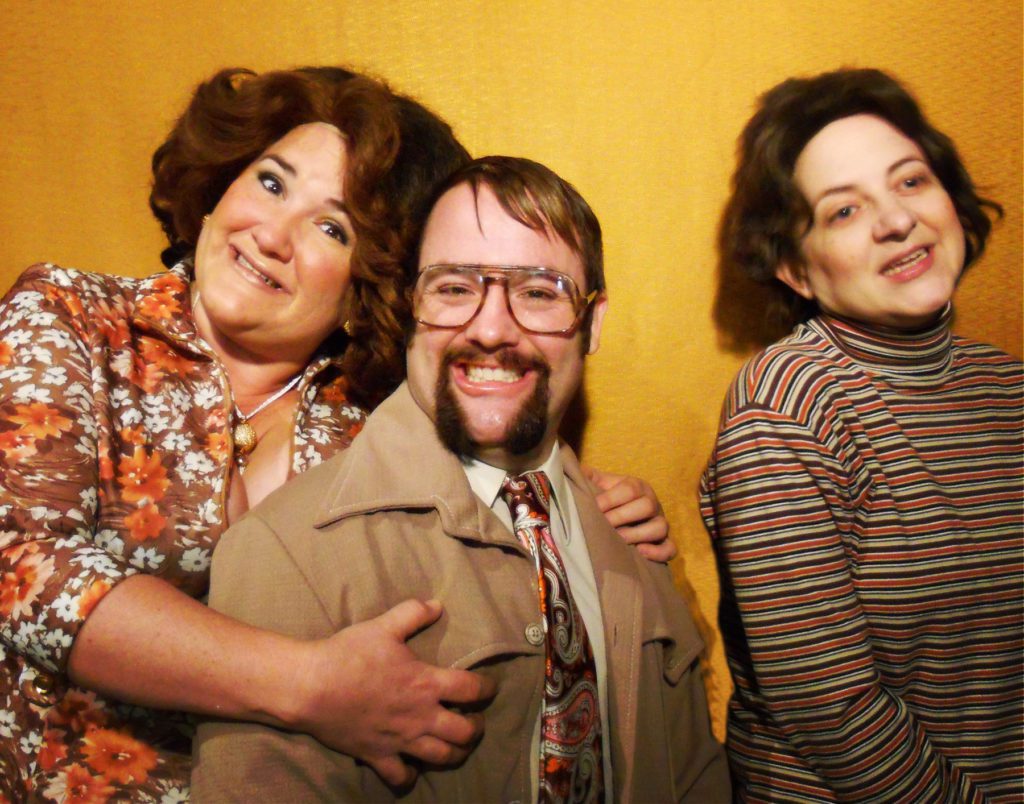
Inventive Buntport Theater members have again taken a literary classic and skewed it in their own inimitable manner. Perceiving similarities between Sophocles’ Greek tragedies and today’s soap operas, they chose to produce a “modern” version of “Electra” by Sophocles — a violent tale of murder and more murder.
The “Electra Onion Eater” set includes a kitchen, an outside green area with a grave and a den-like space with easy chair and TV.
Electra weeps a great deal in the original as she mourns her late father, Agamemnon, who was killed by his wife, Electra’s mother Clytemnestra, so she could marry Aegisthus.
Buntport’s writing team has Electra (Erin Rollman) constantly chopping onions for pie to ensure copius crying, while evil Clytemnesrtra (Hanna Duggan) watches soaps on a TV in the next room.
Electra longs for her brother Orestes (Erik Edborg) who wanders home from his travels, accompanied by a guy named Bruce (Drew Horwitz).
Characters intersperse lines from the original play with new dialogue and pretty much follow Sophocles’ melodramatic plot, as they watch/listen to the cast of “Search for Tomorrow” (taped by Karen Slack, Michael Morgan, Jessica Roblee and Brian Colonna) — and plot to eliminate Clytemnestra.
There will be blood!
As audiences have come to expect, the production is clever and silly. Leave preconceived expectations at home and come to enjoy the work of a very original theater company. Members have worked together in Denver for more than 10 years since they graduated from Colorado College together, using classics as source material as they write their material — and at times creating new works, including musicals, from scratch.
(I found it useful to look at a summary or two of Sophocles’ original play prior to heading for the theater, just to get the names straight!)
-Sonya Ellingboe, November 20, 2013, Our Parker News
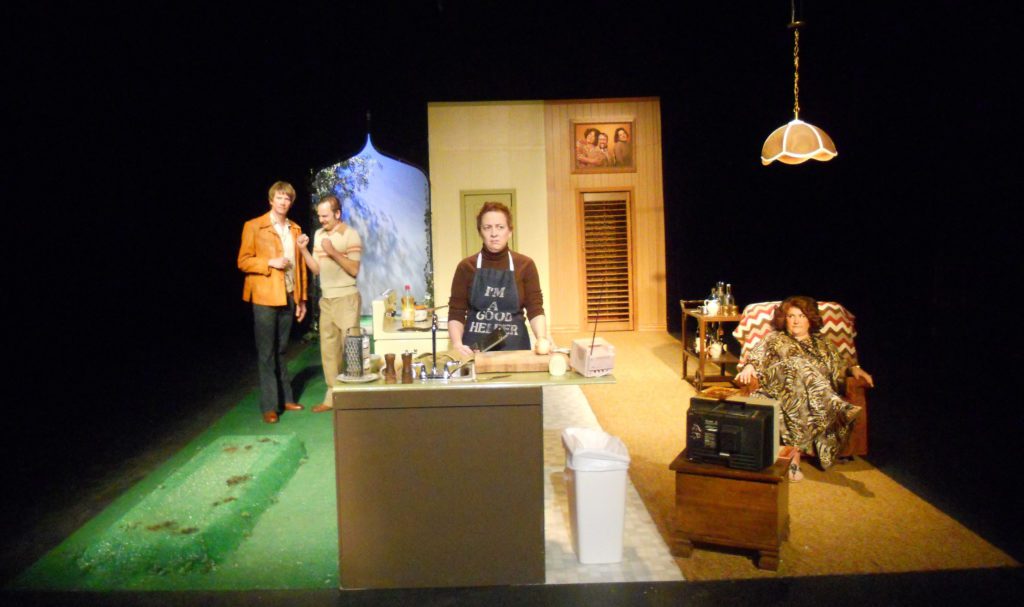
The best part of Electra Onion Eater, which opens Buntport Theater Company’s thirteenth season, comes at the beginning, when Erin Rollman stages a television show called Cooking With Electra and proves yet again that she’s one of the top comic actresses around. Poor Electra is aiming at Julia Child-style chumminess and cheer, but her output consists solely of onion tarts, and her sorrow is overwhelming. She chops and chops, but her anguish breaks through in great howls. She picks up a vicious-looking cleaver and tries again, uttering a cry of vengeance with each chop — Hah! Hah! Hah! — as the blade comes down rhythmically and you fear for her fingers. Periodically she breaks off for more shrieks and moans, or to calmly explain the biology of tears. The warring expressions on Rollman’s pale face are priceless, and this scene is completely original, howlingly funny, almost frighteningly intense.
Television dominates this original play based on the story of Electra and written by members of Buntport and Drew Horwitz. The action is set in the 1950s, and Electra has a small, clunky television set in her kitchen. When her favorite soap starts, she pauses in her endless chopping and leans in to watch. In the living room, her mother, Clytemnestra, played by Hannah Duggan, is ensconced in a cozy chair in front of another television. You can hear the soap they’re both watching. It’s the work of musician/sound artist Adam Stone and concerns a doctor, the blind patient to whom he wishes to donate his corneas in an operation he’ll carry out himself, and an obsessive, stalking lover — and in a twisted way, it shows that the melodramatic imaginings of classical Greek tragedy are still with us today…or our view today of the ’50s. These moments when they’re absorbed in the same program represent the only time that Electra and Clytemnestra are remotely in sync with one another. We’ve seen some intense theatrical mother-daughter pairings recently, but this is the most intense yet: These women hate each other with a black-hearted, icy fury.
Electra plans to kill her mother because Clytemnestra is responsible for the death of her father, Agamemnon, and, like Gertrude in Hamlet, is now happily cohabiting with the man who helped in the deed, Aegisthus. The murder was motivated by Agamemnon’s sacrifice of Iphigenia — Clytemnestra’s other daughter and Electra’s sister — to appease the gods and cause them to smile on his military ventures. Electra is hoping her long-lost brother, Orestes, played by Erik Edborg, will return to help in her task of vengeance. Why the onion pie? Because sometimes even the most dedicated heroine of a Greek tragedy needs a little help in summoning the endless supply of tears she’s required to shed.
Agamemnon is buried in what looks like a narrow alley behind the kitchen, and Orestes does indeed come back — wearing a snappy cordovan leather jacket that matches his orange-brown shoes and accompanied by a friend named Bruce (Horwitz) — to venerate the grave. He knows Electra is longing to see him, but he won’t reveal himself to her just yet. His plan involves spreading fake news about his own death to lull Clytemnestra into a false sense of security. Then — presumably because he’s unaware of the existence of that lethal cleaver — he’ll kill her with Bruce’s pocket knife. So Electra and Clytemnestra fight. Bruce and Orestes plot. Offerings, mostly of tufts of hair, are made on the grave. In moments of deep joy or sorrow, the protagonists sing commercial jingles.
Electra Onion Eater showcases, once again, the comic inventiveness of the Buntport troupe, but the rest of the play doesn’t live up to the inspired lunacy of the beginning. Peeling off the layers of this Onion may be entertaining, but reveals no deep meaning.
-Juliet Wittman, November 14, 2013, Westword
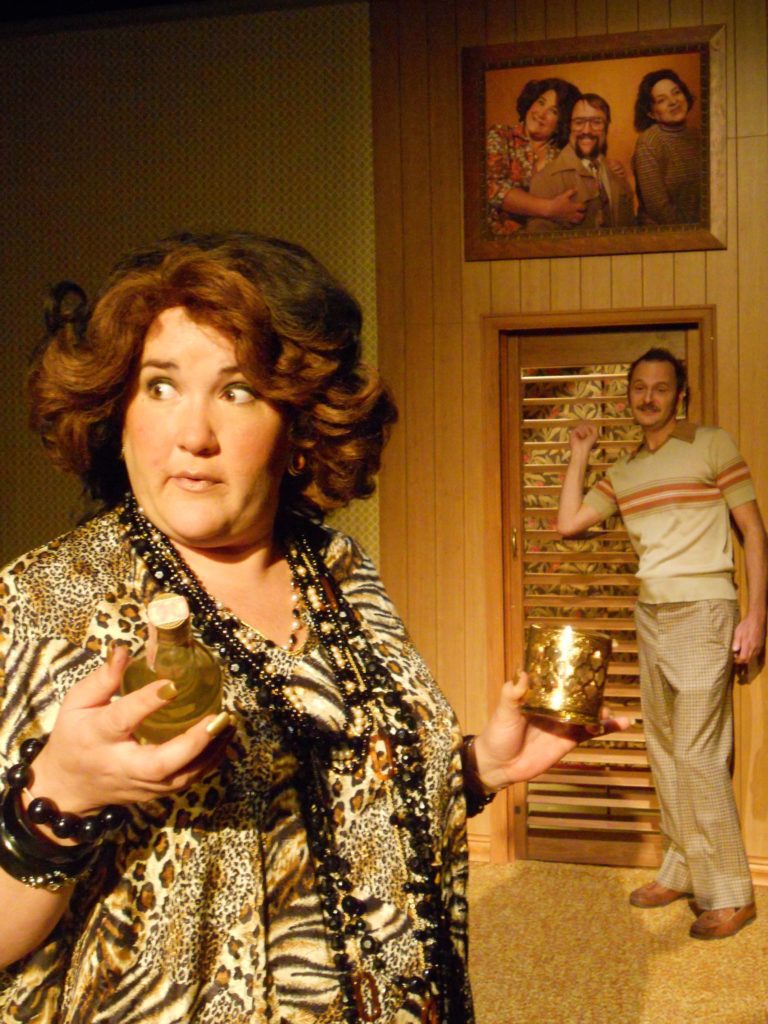
THAT’S A WEEPY ONE
Electra Onion Eater is a modern adaptation of Sophocles’ Electra. Murder begets murder in a classic Greek tragedy twisted into a Buntportian comedy. (more…)
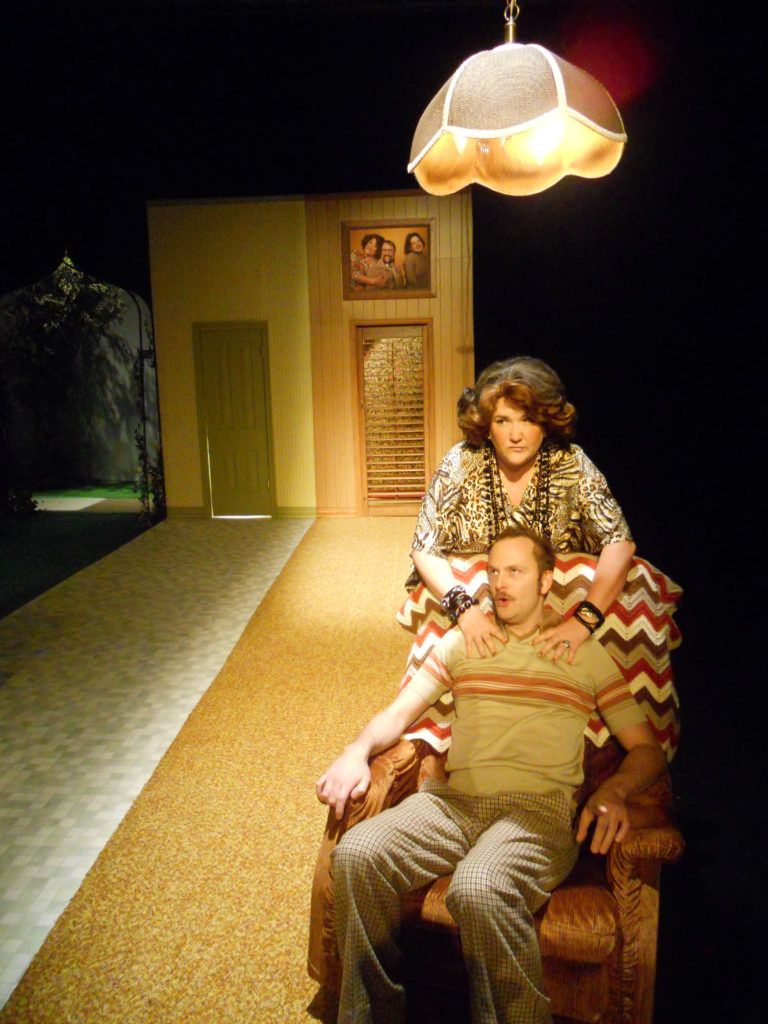
Buntport Theatre is a gift of the gods! Their lampooning of Sophocles’ Greek tragedy “Electra” is a delectable ambrosia.
“Electra Onion Eater” proves once again that the demigods over at Buntport have the recipe for turning the most tragic tale into an evening of theatre that’s an Olympian laugh riot! Anyone who saw their send-up of Shakespeare’s “Titus” knows that.
The genius of this troupe is that they are able to sublimate ego (Really? I know!) and collaborate in the writing and directing in order to bring forth shows that are somehow sublimely smart and sensationally silly.
This one is sort of a tragedy of the geeks that gives us a mash-up of contemporary sit com and advert jingle while providing a nudge and a wink to the mask which uneasy wears the frown.
Hannah Duggan is the magnificently breezy and carefree matriarch, Clytemenestra. Erin Rollman is her hysterical (and hysterically funny) daughter Electra who, continues to grieve for her dead daddy Agamemnon by cryin’ like a rat eatin’ onions. Erik Edborg is Orestes, Elektra’s long lost bro.
In this glimpse into the dirty laundry of one of the original dysfunctional families of Greek theatre the Buntport crew has brought in guest artist Andrew Horwitz as friend of the fam, Brucey-Goosey.
Even if you have never heard of Sophocles’ “Electra” … No Worries! The show’s so tight you get it all right from the start.
This show comes with the highest of recommendations from this reviewer’s desk.
— David Marlowe, November 8, 2013, Blogspot.com

Buntport Theater opens their 13th season with their latest original creation, Electra Onion Eater, a comic retelling of Sophocles’ classic Greek tragedy Electra. The play is set in the 1970s, and interacts with a televised soap opera that two of the characters are watching, but somehow still manages to keep most of the basic plot elements. This is vintage Buntport — taking an existing story, twisting and reinterpreting it, infusing it with silliness and irony, but staying true to the essence of the original.
Electra Onion Eater is a play about revenge and onions. Electra is (understandably) upset that her mother, Clytemnestra, has killed her husband Agamemnon, father to Electra and Orestes. Like any good Greek tragedy, oracles and gods direct the action, and not much makes rational sense. Suffice to say that Electra impatiently awaits Orestes return, anticipating that he will then kill Clytemnestra and her lover. In the midst of all this, Electra engages in conversation with the characters in the soap opera she watches every day, getting their advice and perspective on things. The script simultaneously pokes fun at the ridiculousness of the original story and honors it, a strange contrast reinforced by individual incongruous juxtapositions scattered throughout. Electra wails and cries frequently, usually blaming it on the onions that she chops and cooks into pies, with an actual oven onstage, using smell to bring the audience more into the action.
As usual, the Buntport collective directs the show. They have made the blocking formal at times, with characters slowly striding downstage in parallel, each in their own “lane.” The set imposes restrictions on movement that force a lot of upstage-downstage movement, further enhancing the overall formality. Throughout the show, everything consistently combines the classic and the contemporary, but does so in a way that fits together.
Erin Rollman is quirky and disturbed as Electra, incessantly preparing onion pies, beating her chest in anguish. She opens the show by herself, building the context and her character clearly, covering a wide range of emotions credibly. Her preparation of onion pies sets a new level for “stage business” that may not soon be equaled. Hannah Duggan is Clytemnestra, the superficial mother, clearly impatient with Electra’s constant wailing. She is also a flirt, trying to seduce poor Bruce, played by temporary Buntporter Drew Horwitz. Horwitz’s Bruce tries (unsuccessfully, of course) to bring sanity and a voice of reason to the story, questioning whether there really needs to be still more killing. Orestes, played by Erik Edborg, is unable to act on his own, following the oracle’s instructions to the letter. The recorded voices of an impressive group of local actors, including Karen Slack, Michael Morgan, Jessica Robblee, and Brian Colonna deliver just the right amount of melodrama for the soap opera.
The set design combines formality with a 1970s period look, including a functional kitchen for preparing onion pies. The stage is split into three lanes, allowing for some fun formal movement. The costumes are delightful, hitting just the right tacky 1970s look. The lighting is basic but sound, providing good illumination throughout. The sound, by frequent Buntport collaborator Adam Stone, particularly the recording of the soap opera, is detailed and accurate, making the interaction between those on stage and the soap opera characters both more real and surreal. The design elements are well integrated into the overall production, something that Buntport, with their comprehensive collaborative approach, does consistently very well.
Electra Onion Eater is a lot of fun. It constantly juxtaposes opposites, is filled with comedy, and still stays true to the original. Each time I go to Buntport, I expect comic and creative brilliance, and even these high expectations are often exceeded. While Electra Onion Eater was not quite to the level of genius that some of their shows have been, it is still very entertaining and creative, and well worth seeing.
— Craig Williamson, November 7, 2013, North Denver Tribune
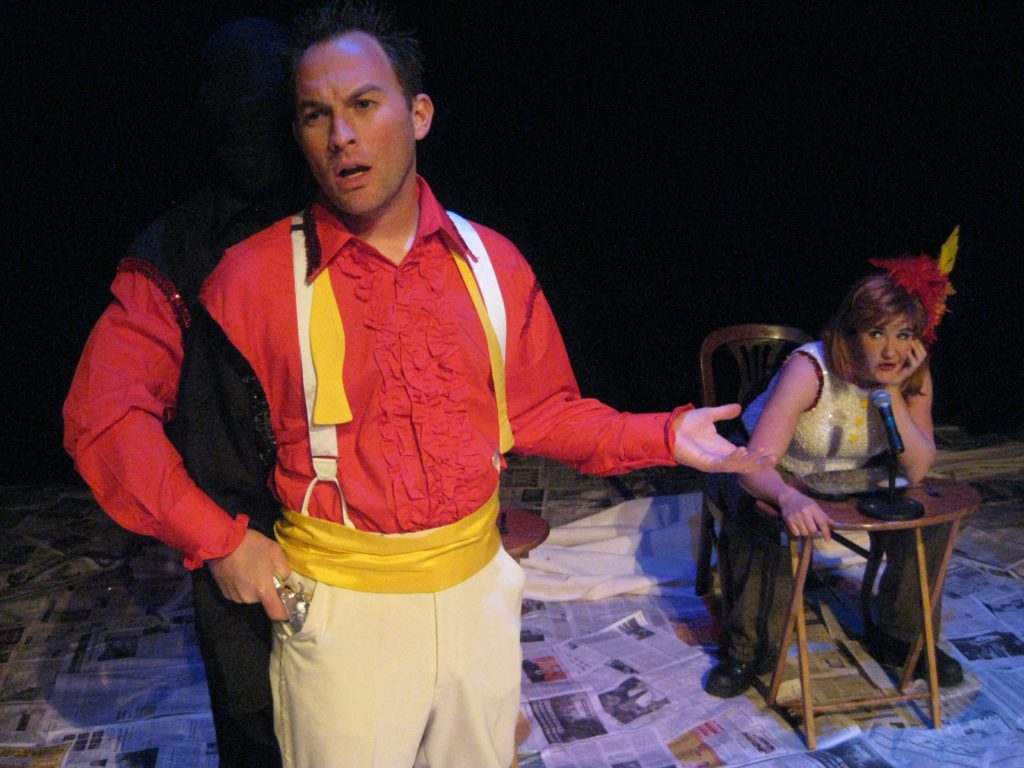
When the magician pulls the rabbit out of his hat, no one thinks about the rabbit. It’s the magician who basks in the gloried applause. After all, he pulls a rabbit out of an empty hat.
Therein lies the problem.
Who is this rabbit? Isn’t he part of the magic? Or is he, after all, the magic itself?
The collaborative Buntportians, along with Adam Stone composer and lyricist, decided it was about time to seek out the rabbit and oh what a surprise they let themselves in for. The result is Jugged Rabbit Stew, the musical playing at Buntport through June 19. Charming, delightful, poignant, thoughtful Jugged Rabbit Stew is couched with humorous entanglements of the serious and even with just one-week left, should not be missed because of its electrifying creativity.
Discovering Snowball, eagerly and delightfully played by Erik Edborg, although there is no sign of Edborg anywhere to be found, there is a magic rabbit that has had it with the hat trick. After all, who gets the credit and glory? Not Snowball. It’s Alec the Amazing and All-Powerful, deliciously played by Evan Weissman.
Schlepping around in pajamas, robe, and bunny slippers, Snowball falls into a deep depression. Eating only mashed potatoes, wanting to be left alone to watch home movies over and over again.
Mystical Marla loves Snowball, and begs him to return to the magic show. Hannah Duggan takes on Mystical Marla with good reason. Magical as Snowball is, sometimes he doesn’t always complete his eye-popping stunts. In sawing off her legs during the last show, he re-connected Marla with a pair of man’s legs. Having trouble controlling them, they don’t always do what Marla wants them do.
All Alec ever wanted to do was to be a magic man. He wanted to be appreciated and loved. Nothing worked, until he found Snowball in a cage by a dumpster. The magic belonged to Snowball, and Alec ate it up knowing full well, deep inside, he “needed someone to complete him”.
Alec and Marla would do anything for Snowball, they’d become whatever he wanted them to become, and they’d be whatever he wanted them to be.
Snowball could care less.
Not only did he connect Marla with the wrong legs, he made Alec disappear. In the reappearance Alec was missing his right arm, which independently appeared on its own. Dressed in black from head to foot except for his right arm, Brian Colonna plays The Arm with delectability. It’s The Arm, dressed in red that is seen, heard and paid attention to. Unbelievable as it sounds, the Arm richly becomes a character all to its own. You hear him, see him, believe him, and, oh, the arm has much to say.
In his cock-eyed upside world of confused Fate, Snowball takes great delight in collecting objects and hanging them from the ceiling. And he does this because? That’s what Marla wants to know. Why?
The latest acquisition just happens to be a woman in a rocking chair. Alec’s biggest Fan, she attended many of the magic shows. For a while she even gave Snowball hope. Something went sour, and she ended up hanging from his ceiling.
Erin Rollman stuns the senses with her professionalism, sitting in a rocking chair, hung by cables for the entire show, Gaa Gaa over Alec, finding a wondrous sense of love with The Arm, playing a bright-eyed simplistic little girl in a woman’s body awed by the magic of an insolent broken hearted rabbit and a starry-eyed magic-less magician competing for attention from The Arm.
Buntport’s enchanted imaginative world draws in the audience with exquisitely defined characters expertly brought to life by imaginative, definitive artists.
As Marla presses Snowball for the why of the collection, this encased world explores questions of love, defining identity, fate verses destiny verses choosing one’s own path, and what happens to the self when a person wishes to become whatever anyone else wants them to become. And what happens when someone who has no magic, but hungers for it, steals the magic in one’s life for credit? Intriguing how this make believe world coincides with today’s society.
Jugged Rabbit Stew is simply a brilliant piece of work that amuses, tugs at the heartstrings, and with clever lyrics points the thought process into bold directions.
With his grouchy, self-annihilating, depressed self, one still wants to reach out and hug the rabbit. He, who hates to be petted since a little girl who just wanted to love him, petted him once too often.
Snowball can’t forget his mother and father. In a clever piece with rabbit marionettes he finds himself singing with them, Oh father you look so free. Oh mother, am I what you thought I’d be? His mother responds, My son, there is no limit to how great you’ll become. By now the magic seems meaningless to Snowball, and he begins to see his fate float toward a less desired direction.
Jugged Rabbit Stew features the talents of Steven J. Burge, GerRee Hinshaw, Andrew Horwitz, Clarity McKay, and off stage SamAnTha Schmitz. Gypsy Ames deserves credit for co-creating Snowball’s mask. After Snowball’s disappointing ride to glory, far be it from me to ignore credit when credit is due.
A fun game for Jugged Rabbit Stew exists on Buntport.com. The CD is available for purchase for $10.00 at Buntport, and it’s worth every dime.
There’s only one weekend remaining in the run of this brilliant production. They have been playing to sold- out houses. No surprise here. Buntport’s Jugged Rabbit Stew provides a refreshing, humorous, poignant slice of life in a wondrous make-believe world that will not want to go away. It makes sense. Think twice the next time you want to hug a bunny once too many times. Magic gets thrown away all too often just because it isn’t recognized for what it is.
-Holly Bartges, June 15, 2010 , Colorado BackStage
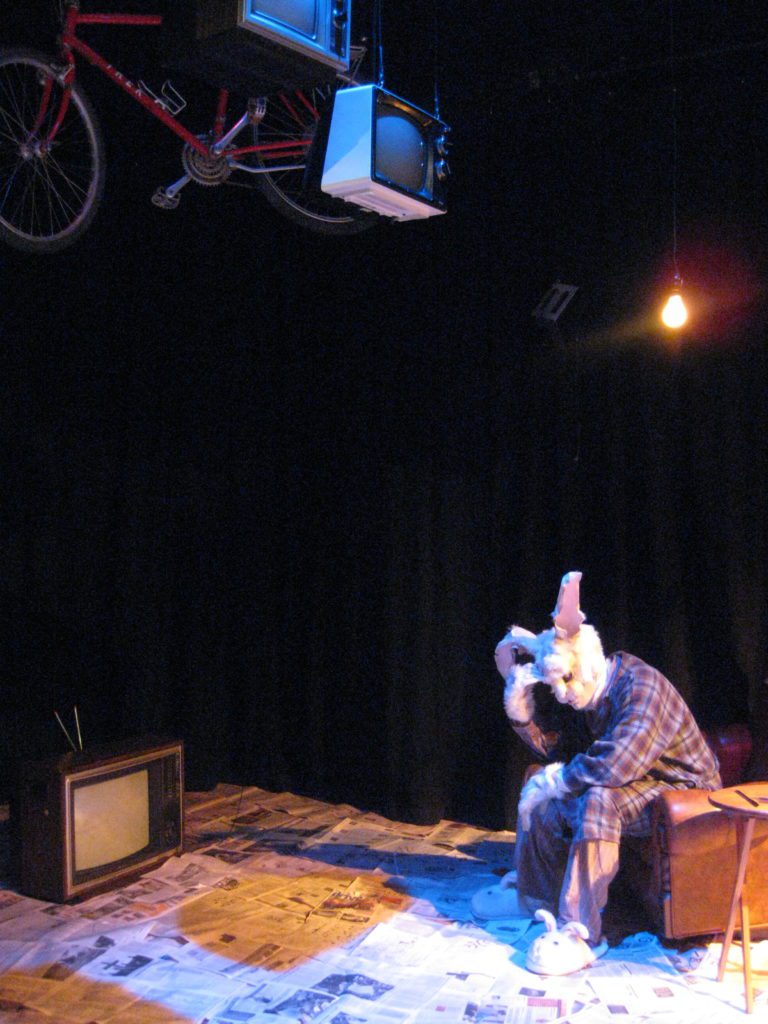
We have moved into full-on hallucinatory territory.
Buntport’s final production of its 10th season is “Jugged Rabbit Stew,” an original musical that is fascinating, entertaining and thought-provoking in the Buntport tradition.
Except that there is no tradition. Every time it seems that the collaborative is about to lapse into a house style, the group subverts itself, turns its approach inside out, pies itself in the face. In a culture where art and entertainment is churned out with assembly-line predictability, Buntport keeps things fresh and alive.
Just as Buntport is a theater in the existential sense that it’s a group of people that explores the human condition live onstage, “Stew” is a musical in that it contains songs. Everything else is up for grabs. The plot is marginal, the characters are, literally, fragmented, tangential speculations abound, and in the end the whole contraption just kind of drives off the edge of a cliff.
It’s great!
The central figure is a giant magical rabbit, played by Erik Edborg, clad in ears, paws and anger, chugging booze from a hutch’s water dispenser. He is the deus ex machina – ruling the others on stage like a sociopathic Harvey, or the furry, fanged Frank from “Donnie Darko.”
His victims/cohabitants in his newspaper-lined rectangle of a room are his magician, Alec the Amazing and All-Powerful (Evan Weissman), magician’s assistant Mystical Marla (Hannah Duggan), Erin Rollman as a Woman suspended in space, along with a handful of props, above the stage for the length of the show, and Brian Colonna as Alec’s missing right arm.
Yep.
The score is by Adam Stone, who previously collaborated with Buntport last year on another original musical, “Seal. Stamp. Send. Bang.” He’s a facile composer who’s conversant in the modern musical style – flowing, pop-catchy, swooping ballads – as well as genre pieces (for instance, a gentle country/Western ode, “Hand in Hand”).
More importantly, you can tell from his writing and arrangements that his skills are extremely broad and deep: his work simultaneously reinforces the form’s traditions and asks pointed questions of it – for instance, how do you make rhymed couplets out of the chaotic premise, and singable ones at that?
Yet, Stone and Buntport do so – like Cole Porter on acid. Buntport’s members can sing, too, which is a more complicated task than the layperson might think. Besides staying tuneful and in key, a musical performer has to sell the number, stay in character, move through choreography … and breathe. Daunting, but they do it. And numbers such as “When Love is There to Blind You,” “Take Me, Break Me, Make Me Something More,” and “That Special Hare” are stand-alone good.
(Um, confession – I have been playing the cast album in the car and singing along … loudly. That’s an endorsement – CDs are available for purchase in the lobby!)
There’s no plot to summarize. Every character suffers from incompleteness. Everyone wants to be something else — as one lyric states, “To be the version of myself/That I want the world to see.” Amazing Alec’s right arm states, “I don’t have a pocket – that’s my tragic flaw,” and most of the others mull over the tragic-hero state and the fate implied for such a figure during the show. Death, fate and love are the themes here, and they are covered from a multitude of angles as the show careens forward.
Mystical Marla sports the bottom half of a car mechanic, thanks to Snowball’s magical wrath. Ditto for Alec, who can’t do much prestidigitation without his missing limb. Meanwhile, Arm (Colonna somehow performs covered in black, save for his brightly clad appendage) falls in love with Woman; everyone is at odds with each other, and all clamor for love and resolution from Snowball, who can only perceive himself as prey.
The abrupt and brutal and artfully staged conclusion still has me wondering what the hell happened. In honor of it, I won’t offer the usual sweeping statement or grandiose deduction or satisfying summation that form the final-paragraph-ending “kicker” of a review; “Stew” is a good, thought-provoking show and you should go and experience it.
Excuse me, I need to go drive around and sing now.
-Brad Weismann, June 10, 2010, bradweismann.blogspot.com